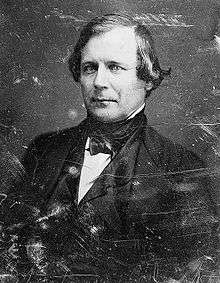William K. Sebastian
William King Sebastian (1812 – May 20, 1865) was an American planter, lawyer, and U.S. senator from Helena, Arkansas. He represented Arkansas as a U.S. Senator, Democrat, from 1848 to 1861. Sebastian withdrew from the Senate at the start of the Civil War and was later formally expelled by the Senate. He took no active part in the Confederate government, and was reinstated by a posthumous resolution in 1877.
William K. Sebastian | |
|---|---|
 | |
| United States senator from Arkansas | |
| In office May 12, 1848 – July 11, 1861 | |
| Preceded by | Chester Ashley |
| Succeeded by | Alexander McDonald |
| Member of the Arkansas Senate | |
| In office 1846-1847 | |
| Personal details | |
| Born | William King Sebastian 1812 Centerville, Tennessee, U.S. |
| Died | May 20, 1865 (aged 52–53) Memphis, Tennessee, U.S. |
| Resting place | Dunn Family burying ground, Phillips County, Arkansas, U.S. |
| Nationality | American |
| Political party | Democratic |
| Spouse(s) | Amelia Dunn
( m. 1838; died 1864) |
Early life
Sebastian was born in Centerville, Tennessee in 1812; sometime around 1834 he graduated from Columbia College, also in Tennessee, and began studying law. In 1835 he was admitted to the bar and began practice in Helena, Arkansas; later he became a cotton planter. From 1835 to 1837 he was a prosecuting attorney; he served as a circuit court judge from 1840 to 1843, in which year he was made an associate justice of the Arkansas Supreme Court. In 1846 he became a member of the state Senate, serving as its president until 1847. Also in 1846 he served as a presidential elector on the Democratic ticket.
Political career
In 1848, upon the death of Chester Ashley, he was appointed to the United States Senate, subsequently being elected in his own right. He was reelected in 1853 and 1859. During his time in the Senate, he served as the chair of the Committee on Manufactures, as well as on the Committee on Indian Affairs. He supported Superintendent of Indian Affairs for California and Nevada Edward Fitzgerald Beale's plans to form a series of Indian reservations in California, garrisoned by a military post, on government owned land. The Indians were to support themselves by farming. The first of these reservations, the Sebastian Indian Reservation was named for him.[1]
Later life
In July 1861 he was expelled for his suspected support of the Confederacy. Upon his ejection from the Senate, Sebastian returned to Helena, where he lived for the duration of the Civil War and practiced law. After federal troops occupied Helena, he moved to Memphis, Tennessee, in 1864 and resumed the practice of law; he died there on May 20, 1865, and is buried in a private family cemetery in Phillips County. Sebastian County, Arkansas is named for him. In 1877, the Senate revoked the resolution of expulsion which they had passed upon Sebastian, and consequently paid the compensation due to Sebastian's children.[2]
See also
- List of slave owners
- List of United States Senators from Arkansas
- List of United States Senators expelled or censured
References
- Boyd, William, H., A California middle border, the Kern River Country, 1772-1880, The Havilah Press: Richardson Texas), 1972.
- Petition of the Children and Only Heirs of the Late Senator William K. Sebastian of Arkansas 43rd Congress.
Further reading
- Kansas-Lecompton Constitution: Speech of Hon. W. K. Sebastian, of Arkansas, on the Admission of Kansas and Minnesota (Speech). Washington: Lemuel Towers. March 10, 1858. Retrieved March 27, 2016.
External links
- United States Congress. "William K. Sebastian (id: S000216)". Biographical Directory of the United States Congress.
- William K. Sebastian at Find a Grave
| U.S. Senate | ||
|---|---|---|
| Preceded by Chester Ashley |
U.S. senator (Class 2) from Arkansas 1848-1861 Served alongside: Solon Borland 1848–1853 Robert W. Johnson 1853–1861 Charles B. Mitchel 1861 |
Succeeded by Alexander McDonald(1) |
| Notes and references | ||
| 1. Because of Arkansas' secession, the Senate seat was vacant for seven years before McDonald succeeded Sebastian. | ||
